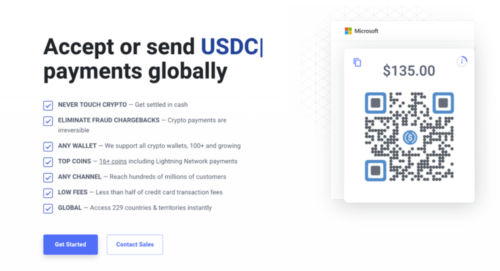How would an e-commerce or mobile gaming site accept crypto payments for business?
Is it as difficult as it sounds or can it actually be pretty simple to set up?
In this post you’ll learn about the benefits, popular crypto options, and step-by-step instructions to start using crypto payments for business.
Key Takeaways:
- Crypto Payments Are Easy to Set Up: With the right tools, such as crypto payment processors, businesses can easily integrate cryptocurrency payments without dealing with crypto themselves, thanks to instant fiat conversions.
- New Customer Base: About 65% of crypto holders said they would like to start making payments with crypto.
- Stablecoins Reduce Volatility: Stablecoins like USDT and USDC are widely favored due to their price stability, making them ideal for businesses looking to avoid the volatility associated with traditional cryptocurrencies.
Benefits of Using Crypto for Businesses
One of the most compelling reasons to accept crypto payments is the potential to tap into an ever-growing customer base.
With approximately 560 million individuals worldwide holding cryptocurrencies, businesses have a golden opportunity to engage with new demographics.
Moreover, integrating cryptocurrency payments can lead to lower transaction fees and faster transaction times.
Unlike traditional payment methods that often come with high processing fees and delayed settlements, crypto transactions are typically cheaper and faster, providing businesses with almost instant crypto payments access to funds.
These advantages not only enhance the customer experience but also improve operational efficiency, making it a win-win for both parties.
Increased customer base
Accepting cryptocurrencies enables merchants to attract tech-savvy consumers who prefer using alternative payment methods.
In fact, according to a recent report by Triple-A, about 65% of crypto holders said they would like to start making payments with crypto.
This preference is particularly strong among younger generations and international customers who value the flexibility and security that digital currencies provide.
Additionally, multinational companies that accept cryptocurrencies can cater to a wider customer base, enhancing payment flexibility across borders.
This approach not only opens up new markets but also strengthens customer loyalty by offering a payment method that aligns with their preferences and values.
Lower transaction fees
One of the significant financial benefits of accepting cryptocurrency payments is the reduction in transaction fees.
Traditional payment processors, such as credit card companies, often charge high fees that can eat into a business’s profit margins.
In contrast, cryptocurrency payment processors typically charge fees of around 1% or less.
This substantial difference can lead to considerable savings, especially for small businesses operating on tight budgets.
Moreover, using cryptocurrencies helps businesses avoid international currency fees, as they are not tied to any specific country.
This advantage is particularly beneficial for large corporations that engage in cross-border transactions, allowing them to bypass currency exchange fees and expedite payments.
Faster transaction times
Time is money, and this adage holds particularly true in the world of business transactions.
Cryptocurrency payments offer a significant advantage in terms of speed, with transactions being processed in a matter of minutes.
This rapid processing time stands in stark contrast to traditional banking methods, which can take days to settle transactions.
Immediate access to funds improves cash flow, allowing businesses to manage their operations more effectively and respond quickly to financial needs.
Popular Cryptocurrencies for Business Payments
When it comes to accepting cryptocurrency payments, not all digital currencies are created equal.
Businesses typically favor well-known cryptocurrencies like Bitcoin and Ethereum due to their widespread adoption and robust infrastructure.
These cryptocurrencies offer the advantage of being widely recognized and trusted, making them a safe bet for businesses looking to integrate crypto payments.
Stablecoins such as USDT and USDC are also popular choices due to their price stability and ease of conversion.
Unlike other cryptocurrencies that are subject to significant price volatility, stablecoins are pegged to the value of a fiat currency, providing a more predictable transaction experience.
In fact, stablecoins account for about 70% of all cryptocurrency trading volume.
This stability makes them particularly appealing for businesses that want to avoid the complexities associated with fluctuating exchange rates.
How Businesses Can Get Started with Crypto Payments
Getting started with crypto payments may seem daunting, but it doesn’t have to be.
The first step is choosing a reliable crypto payment processor.
Companies like CryptoProcessing.com, Coinbase, and BitPay offer comprehensive services to facilitate crypto payments, making it easier for businesses to integrate this new payment method.
Choosing a Crypto Payment Processor
Let’s now compare these top three options to give you a better idea of which might be the best fit for you.
1. CryptoProcessing.com

CryptoProcessing has been a leader in crypto payments for over a decade, offering a comprehensive solution for businesses looking to accept crypto with minimal hassle.
Here’s why it’s a top contender:
- Extensive Currency Support: Supports over 40 cryptocurrencies, including major assets like Bitcoin and Ethereum, as well as stablecoins such as USDT and USDC. This variety gives businesses maximum flexibility in accepting payments.
- Instant Conversion: Automatically converts cryptocurrency into fiat currency (like USD or EUR) instantly, mitigating the risks of crypto price volatility. Businesses can accept crypto without ever handling it directly.
- Industry-Leading Security: Implements advanced security features like two-factor authentication (2FA) and transaction monitoring to safeguard transactions against fraud.
- Lower Fees: CryptoProcessing typically charges less than 1% per transaction, making it an extremely cost-effective solution for businesses.
- Dedicated Integration Support: Offers personalized integration services, guiding businesses step-by-step through the setup process, ensuring a seamless experience.
2. Coinbase Commerce

Coinbase Commerce is another popular platform for accepting crypto payments, especially for businesses familiar with the Coinbase ecosystem.
It’s a solid option for a few reasons:
- Higher Fees: Coinbase’s transaction fees can be higher, especially if you’re converting crypto into fiat. This might impact profit margins for smaller businesses.
- Security: Coinbase is well-regarded for its security infrastructure, offering strong protection for businesses and customers alike.
- Ease of Use: Coinbase’s interface is easy to navigate, making it suitable for businesses that prefer simple integration, although it lacks the personalized support CryptoProcessing provides.
Why Choose Coinbase? It’s ideal for businesses already using Coinbase for other crypto services but may fall short when it comes to fee savings and personalized support.
3. BitPay

BitPay has been around for years and is yet another reliable choice for accepting cryptocurrency payments:
- Trusted and Established Platform: BitPay has also been in the crypto payment industry for over a decade, making it a trusted and reliable choice for businesses.
- Seamless Integration: BitPay provides a range of integration options, including APIs and plugins for popular e-commerce platforms like Shopify and WooCommerce.
- Security and Compliance: BitPay offers advanced security features like two-factor authentication (2FA) and robust fraud prevention measures.
While Coinbase and BitPay offer solid options for crypto payments, CryptoProcessing outshines them both with its lower fees, extensive cryptocurrency support, instant fiat conversion, and dedicated integration assistance.
Managing Crypto Transactions
Managing crypto transactions effectively is crucial for businesses looking to capitalize on the benefits of cryptocurrency payments.
Crypto payment gateways provide essential services such as enabling fiat currency receipts, managing customer payment experiences, and handling exchange management.
These gateways simplify the process, allowing businesses to focus on their core operations.
Utilizing a crypto payment gateway can offload technical complexity and remove volatility from a merchant’s balance sheet.
The following subsections will delve into specific aspects of managing crypto transactions.
Handling price volatility
Price volatility is one of the biggest challenges businesses face when accepting cryptocurrencies.
To mitigate this risk, businesses can work with partners who convert cryptocurrency to fiat immediately after a transaction, ensuring immediate settlements and minimizing currency risk.
This strategy is particularly effective for international sales, where exchange rate fluctuations can significantly impact transaction values.
Additionally, the irreversible nature of cryptocurrency transactions helps businesses manage their cash flow by eliminating the risk of chargebacks.
Adopting strategies to handle cryptocurrency volatility can help businesses capitalize on the security and efficiency that crypto payments offer.
Accounting and tax considerations
Accounting and tax considerations are critical for businesses accepting cryptocurrency payments. Accurate tracking of transactions is essential for tax reporting purposes, as businesses must account for gains and losses.
This meticulous tracking ensures compliance with tax regulations and helps avoid potential financial penalties.
Understanding the tax implications of cryptocurrency transactions is crucial, as they can significantly affect a business’s financial reporting.
Businesses should consult with tax professionals to navigate the complexities of crypto tax reporting and ensure they meet all legal requirements.
Customer support for crypto payments
Providing dedicated customer support for crypto payments is crucial for enhancing customer satisfaction and trust.
Customers may have questions or face issues when making cryptocurrency transactions, and having a dedicated support team can help resolve these concerns promptly.
Offering full customer support not only improves the overall payment experience but also builds trust in your business.
By ensuring that customers feel supported and confident in the payment process, businesses can foster loyalty and encourage repeat transactions.
Regulatory compliance
Navigating the regulatory landscape is one of the most complex aspects of accepting cryptocurrency payments.
The rapidly changing and often conflicting regulations from various jurisdictions mean that businesses must stay constantly updated to remain compliant.
This is particularly challenging given the decentralized nature of cryptocurrencies, which can make regulatory compliance a moving target.
Compliance teams must have a strong understanding of blockchain technology to effectively navigate these requirements.
Anti-money laundering (AML) compliance is also crucial, as businesses accepting cryptocurrency payments can come under scrutiny from regulatory bodies.
Despite the challenges, staying compliant is essential to avoid enforcement actions and to build trust with customers and partners.
Technical complexity
Integrating cryptocurrency payments can present significant technical complexity due to differences between blockchain systems and traditional financial networks.
Achieving seamless interoperability between these systems is often a major hurdle for businesses.
However, solutions exist to address these challenges.
For example, CryptoProcessing.com provides you with a dedicated integration team that walks you through the entire setup process from start to finish.
Conclusion
In conclusion, while the mainstream acceptance of cryptocurrency is still evolving, the potential benefits for businesses are substantial.
Lower transaction fees, faster payment processing, and enhanced security are just a few of the advantages. However, businesses must also navigate challenges such as price volatility and regulatory compliance.
By leveraging the right tools and strategies, businesses can successfully integrate crypto payments and unlock new opportunities.
Whether it’s accessing a broader customer base or streamlining payment processes, the key is to approach this innovative payment method with a well-thought-out strategy.
As the landscape of digital currencies continues to evolve, businesses that adapt early will be well-positioned to reap the rewards.
Frequently Asked Questions
How can I choose the best crypto payment processor?
To choose the best crypto payment processor, prioritize those with low transaction fees, automatic fiat conversion, strong security measures, and comprehensive API options for seamless integration. These features will enhance your operational efficiency and security.
What are the main benefits of accepting cryptocurrency?
Accepting cryptocurrency offers lower transaction fees and faster payment processing, which can enhance your overall operational efficiency. Additionally, it provides access to a broader customer base and improved security, ultimately benefiting cash flow management.
How do I handle the volatility of cryptocurrency prices?
To effectively handle cryptocurrency price volatility, collaborate with partners who convert cryptocurrency to fiat immediately after transactions. This approach minimizes currency risk and ensures prompt settlements.
What are the tax implications of accepting crypto payments?
Accepting crypto payments has tax implications that require businesses to track gains and losses for accurate reporting. It is advisable to consult with tax professionals to navigate the complexities of crypto tax regulations effectively.
How can my business integrate crypto payments with minimal hassle?
Integrating crypto payments can be streamlined by selecting a reliable payment processor and utilizing their APIs or plugins, along with implementing strong security measures. This approach minimizes hassle and enhances the payment experience for your customers.


 Tags:
Tags:










